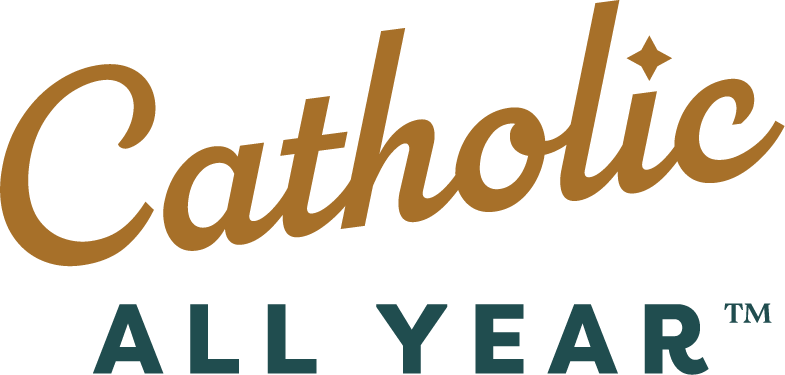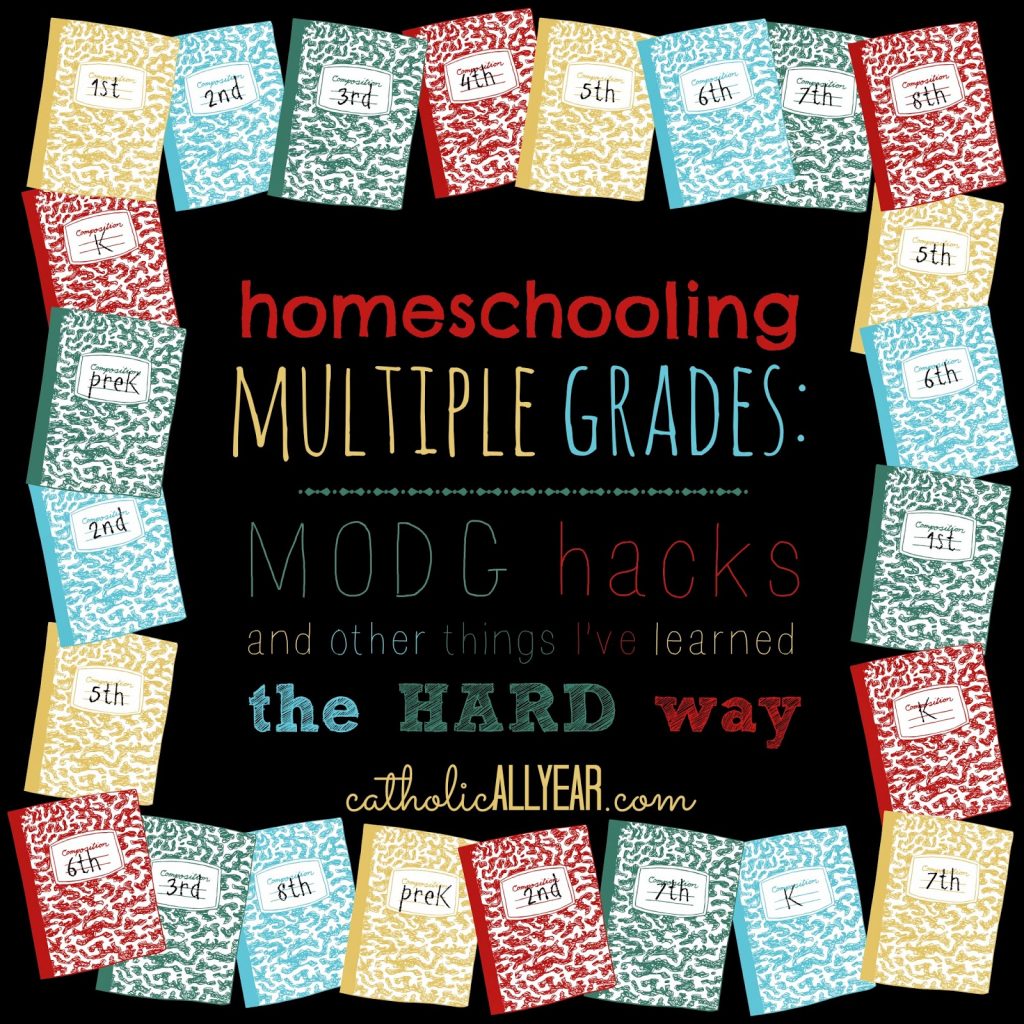Today, I’m answering another mailbag question, and sharing how I handle six kids preschool through middle school all at once, plus a toddler and a fetus.
The Question:
Dear Kendra,
I’m drawn to MODG, but I’m a little scared to commit to it. I’d love more details on the day to day life of how you use MODG. Which online classes do you use? Is it difficult to teach all the different history lessons to your different aged kids? What substitutions do you make to the curriculum? How do you get everything done each day?
Thanks for your time. I love reading your blog, and I incorporate a lot of your ideas into our family life!
Leah
The Answer:
Thanks Leah,
I really do love the Mother of Divine Grace curriculum, it goes with my gut, and I am convinced that their classical methods are time tested and prepare kids well to become lifelong learners, which is my goal. (For more on the founder, Laura Berquist’s, methods, check out her book: Designing Your Own Classical Curriculum: A Guide to Catholic Home Education.)
I have been using the Mother of Divine Grace curriculum for seven years, and have followed it very closely for kindergarten through seventh grade — making only one major substitution. I love all the poetry and stories and art, and the memorization, and discussions, and retellings. I find it to be a very charming and thorough way to homeschool.
But. Having many kids each doing their own MODG school day is challenging to impossible, depending on how you look at it. When I had one kid in school, we sat down each morning and did everything on the syllabus together. Now that I have five kids in five different grades, plus a preschooler and a baby and another one on the way . . . well, I’ve had to come up with a few survival strategies.
1. Older Kids are Responsible for Their Own School Work
This one is the most important. Because, really, when people ask, how can you homeschool all those different grades? The answer is, um, you can’t. But once kids can read, they can direct their own school days. And they must, so that I can work with younger kids who need direct instruction for each subject. I expect my kids grades three and up to be able to gather their own supplies each morning, and take themselves through their syllabus, checking things off as they are completed, and making a note next to things that they need to do with me. Then I expect them to seek me out and ask me to do that work with them, as many times as it takes for me to be able to do it with them.
Recently, I’ve been making a point of having my older kids follow a system while working independently. We’ve had a lot more success doing it this way, than we did when I let them just do things on their own and just check in with me at the end of the day.
The key aspects of The System are these:
- Gather all materials you will need for the entire school day first thing before you sit down for school
- Sit at a table in a common area of the house with enough privacy that you won’t be distracted, but enough supervision that you won’t be distracted. My oldest is in seventh grade and works almost completely independently. I don’t do any regular daily direct instruction with him, so he doesn’t sit at the dining room table with the rest of us, but it didn’t work for him to sit alone in his room. So now, he sits at the kitchen table, by himself, but I can see him from where I sit in the dining room.
- Once you sit down to start your school day, no getting up without permission. I have wanderers. They end up wasting a TON of time between assignments, then they don’t have open blocks of time later in the day to play or do projects of their own choosing. If I keep them on task and not wandering in the morning, they finish in a reasonable amount of time and have plenty of free time to do as they please. Whether or not they have free time in the afternoon really changes their perception of school.
- Do the things on your checklist in order.
- Estimate the time you will need to complete an assignment, then set a timer and try to complete the work in that amount of time. If the timer goes off and you’re not finished, realize that you are not focusing and working as efficiently as you could be. Resolve to do better, and finish the assignment.
- Check things off as they are finished.
- Check in with mom verbally between assignment.
- When you think you are done for the day, double check each thing on your checklist.
- Get your checklist signed off by mom or dad.
The System has made my older kids more efficient and more accountable. In a big family with lots of different grades, it’s easy for kids to purposefully or inadvertently skip assignments. If I get busy (as I often do) and don’t check in with them, more and more things get skipped, and it reinforces the behavior pattern. Then weeks or months later, it all comes to light and it’s a huge crisis and a big hassle. But if we follow The System and stay on top of things, that doesn’t happen. The kids learn to do their work in a reasonable amount of time and to get it all done. If they’ve skipped something, we figure it out right away and it gets done, so there’s no incentive to let things slip through the cracks, and they get lots of time for free play and outside interests.
2. I Combine Grades When Possible
I’ve only been doing this for the last couple of years, but it’s really worked well for us. History hasn’t been an issue, because in the MODG program, kids don’t start history until third grade, and by that time my kids are all able to do their reading independently. The subjects that take up most of my direct instruction time are math and spelling. So, whenever I can make it happen, I combine grades for those subjects.
I mentioned at the top that there is one major substitution the we make, and it’s in our spelling program. MODG recommends a book called The Writing Road to Reading. It’s a giant book of theory about why phonics is the way to go, with some spelling lists at the back. There’s a booklet written by someone else, that goes along with it, as kind of a user’s guide, but I found the whole thing to be very cumbersome and non-intuitive to use. After years of struggling with it, and not doing as much spelling as we should, I made the switch to All About Spelling, which is also a phonics-based program, but very user-friendly, and set up in individual lessons. I am very glad we made the switch.
We do spelling ALL together.
The All About Spelling program uses a multi-sensory approach. There are magnets, and flash cards, and the kids use white boards. It’s a big change from the rest of our school day, and it’s fun to be all together for a change. Well, all except the seventh grader. But my kindergartener, and second, fourth, and fifth graders all do the same lesson together. Usually the preschooler sits in too, and enthusiastically shouts out the names of phonograms that may or may not be the one on the card I’m holding up. For us it has worked really well. I just cycle through books 1, 2, 3, and 4. We can usually do two to three per year. The older kids get to review when we do the early books, and the younger kids just follow along as best they can in the more advanced books, but they all practice the phonograms, and I give them age appropriate phrases and sentences to write out, so it all works out.
MODG uses Abeka consumable math workbooks for first through third grades, then in fourth grade, they switch us to Saxon Math
, a non-consumable, textbook-based math program. I think the progression works, but most of my kids have needed the lessons to be taught to them by me. Trying to do a fourth grade math lesson then a fifth grade math lesson just wasn’t working for me, so I bumped the fourth grader up to the fifth grade textbook as well. There is a lot of cyclical repetition in the Saxon math program, so I think it’s possible to move kids around within a year up or down from their current grade, and still get much of the same material. If you’ve got kids within one grade of each other, this might be a good solution.
Other things we do as a whole school together are morning exercises (running, stretches, sit ups and push ups . . . I do realize it seems silly, but it really helps my kids get the wiggles out before we settle down for school, plus I think exercise is good), morning prayers, and a morning Bible story out of the kindergarten/first grade Children’s Bible
. Over lunch I read aloud to the kids from a chapter book. Since we have a wide range of ages and interests, I just try to pick books we can all enjoy. Sometimes they are more sophisticated: Dr. Jekyll and Mr. Hyde, War of the Worlds, Moby Dick, sometimes they’re more traditional kidlit: Charlotte’s Web, Pollyanna, Stuart Little, Freddy Goes to Florida, The Secret Garden. We’re reading Kidnapped right now. But, I really do find that all the kids can find something to enjoy about each book.
3. Older Kids Help Younger Kids
There just aren’t enough hours in the day to get everything on the syllabus done for my kindergartener and second grader who need help with pretty much everything on there, and also help where needed with the fourth and fifth graders, and check in on the seventh grader. So, if I need to be working with one of the older kids, I have a different older kid take over for me and do one or two subjects with the younger kids. That way we can all still be working.
My seventh grader is teaching Latin
to the fourth and fifth graders. And he and my fifth grader do the majority of the daily work with my kindergartener.
4. Some Things Aren’t Going to Happen
This was a tough one for me to accept at first. But it’s true. There are many lovely things on the kindergarten and first and second grade syllabi that I always, always, always did with my first two kids, that just aren’t getting done regularly with numbers three through five. Art cards, singing hymns, growing bean plants . . . those things are great, but they aren’t a priority, and when things get busy they are the first to go.
But really, we go to museums as a family and enjoy art there. We sing hymns at Mass. We have a garden, and the kids help grow things there. I think there are things on the MODG syllabus for younger kids that are lovely for filling up the day when you only have one or two kids to instruct. But I don’t think they are crucial to get to each day if your days are very, very full with many different grades.
For older grades there are subjects I’ve learned to handle better over the years. One focus of the classical approach that MODG uses is having the student listen to a story, then retell it in his own words as the teacher writes it down, then the student copies out the retelling. My oldest could listen to the assigned four Bible stories one day, then the next day retell them nearly word for word. He would end up with eight pages or more of work to copy out. And I would have him do it. Since then, I’ve figured out what I like to call the “Good Parts Version” (a la The Princess Bride). I read all the assigned stories for the week aloud, then have the student choose ONE of the stories, and the retelling must fit on ONE page. Less writing, fewer tears, and it makes my kids focus more on the content, and what was important in the story.
Another subject that took up a lot of time for us was Saxon math. I like the “spiral approach” and my kids do well with the no-frills textbook. The problem for us was that the suggested timetable in the syllabus calls for 45 minutes for a math lesson, but doing all the problems in each lesson was often taking my kids closer to two hours. We didn’t have time for other things, my kids were frustrated, I was frustrated . . . so I cut the math lessons in half. My kids do odd number problems for odd number lessons, and even number problems for even number lessons. THAT they can accomplish in 45 minutes.
5. I Outsource When Possible
The MODG online classes are a good way to make sure that the important stuff doesn’t also fall through the cracks. Like I said, for us, art and music appreciation are the first things to go when things get busy. So this year, I signed the second, fourth, and fifth graders up to do those classes once a week online with a teacher and a group of adobe-meeting classmates. They are able to do those subjects with a teacher who is not me, so *I* can use that time to work with my kindergartener or seventh grader. Many things being accomplished at once always feels nice. My fourth and fifth graders are also taking a private online math lab, with one-on-one (well, one-on-two) instruction by a math teacher. Math was a subject my fifth grader was struggling with, so I wanted to get her extra instruction and another perspective and teaching technique. They sit down at the computer and can see the teacher’s computer and can type answers, or talk about things over the headset.
My seventh grader is taking six online classes: math, Latin, art appreciation, music appreciation, religion, and history book club. I basically just signed him up for everything I could, in the hopes of creating more accountability for him. It really didn’t work for that, since he is still the one who needs to keep up with his assignments, and that’s where we were having trouble. Also the teachers are so nice that they really don’t give the students a hard time about when assignments are turned in. But he kind of needs that. So we instituted The System. And we have had success with that. But I’ve still been glad he is doing the online classes. It’s nice for him to get some direct instruction that I don’t always have the time or expertise to give him, and he also gets a little bit of social interaction with the other kids in his classes.
So there is my very, very long and complicated answer to your short and simple question. I hope it helps some. If I misunderstood or didn’t quite address your question, please let me know. and let me know if there’s anything else I can do to help.
Cheers,
Kendra
You might also enjoy . . .
A Homeschooling How We Roll
A Day in the Life of Me, Kendra Tierney, in Which a Lot of Things Happen and Often I Don’t Yell
Most of the links above are affiliate links, which means if you click through and shop, you are supporting this blog at no additional cost to you. Thanks!
If you read anything on this blog that is contrary to Church teaching,
please consider it my error (and let me know!). I’m not a doctor or an
expert on anything in particular. I’m just one person with a lot of
experience parenting little kids and a desire to share my joy in
marriage, mothering, and my faith.
you’ve got a question, please send it along to catholicallyear @ gmail .
com . Please let me know if you prefer that I change your name if I use
your question on the blog.




So specific. Thank you!! I'm going to start homeschooling soon as my oldest is 4. Butttt we are super poor 😉 so trying to figure all that out. Is MODG costly or do you possibly know what are the cheapest options?
That's the wonderful thing about MODG is that there are so many options! At the simplest, cheapest level you can buy the book Designing your own Classical Curriculum, which I used for Kindegarten.
I have done MODG with modifications for eons. I have 9 kids, two which are now in college. I agree with a lot of what you said. We could never afford to enroll in MODG and we do modify a lot. We use IEW for most of our language arts curriculum (Fix It for grammar, Phonetic Zoo for Spelling, and their writing program) a lot of which is very independent. We also tend to do different things for science since I had such a hard time finding the books for the earlier grades. This year we used Focus on, which is a lot of fun.
MODG is great and it really promotes independent work in the upper grades which is huge for mom and dad.
Hello! I know this is an older post. But our family (5 kids) is starting MODG this school year. I have been considering IEW for my older 3. But I’m wondering how you incorporate it in to you day? Seems
as though writing is wrapped in to history and religion.
I LOVE Saxon Math. But it takes my daughter (7th grade) right about 2 hours, as well. That's a brilliant solution… now that we're finishing week 30… Zoinks. This is why I love talking (or reading in this case) to other people about how they do things.
Your middle school system is pretty much exactly what I have done with my 7th grader. I'm going to bookmark this post for the fall when we pull our next 2 kids out of school and begin to homeschool them, as well. I love the idea of incorporating the bigger kids into teaching the younger ones. I think it's so important for them to have family responsibilities, and I imagine that it brings a lot of pride and self-satisfaction for the bigger ones to be entrusted with such an important task. And nobody can do it all; a win-win situation!
This was so helpful to read, and a glimpse into the future for us! We are a MODG family with 2 in school grades and 3 in the holding blocks. One little tip for music: we make the hymn singing part of morning time for everyone. So at the beginning of the year I picked the hymns I wanted us to learn as a family. We spend a couple of weeks on each one. We just start our morning time singing the hymn. The Music Masters cds get listened to in the car, and boom. Music is done. 🙂
Our homeschooling process is very similar. We start at a specific time every day and my kids are expected to complete EVERYTHING they can do by themselves, by themselves. Then they come to me for help. I'm down to two left in the house (we go back to Catholic school for high school) – 4th and 6th grade. My 6th grader is almost entirely independent at this point. My 4th grader is probably 80% of the way there, with only help from me on some history, math and writing. I will add that fostering this level of independence is terrific for high school – my kids enter high school needing very little attention from me in terms of monitoring homework, planning ahead, making sure they have their books home at night – all because they learned this at an early age at home. Great write-up – wonderful for friends who ask me about homeschooling!
Great info. We homeschool in much the same way. Should anyone be looking for tips on homeschooling large families be sure to utilize these. I can talk from experience that these tips are SPOT ON. Also, I use both All About Spelling and All About Reading and both are incredible. My 6 year old has down syndrome and we've been using the Pre-reading packet. He can sound out three letter, short vowel words with 75% accuracy. I think that's amazing. My 3 year old loves to sit in on the lessons and is picking up so much. He loves Ziggy Zebra. I also use the All About programs for my 10 year old. I can't recommend them enough. Kendra, I've been reading your blog for quite a while now and it has become my favorite. Practical, witty, real.
You're a better man than I Gunga Den. God bless to all of you homeschooling moms
You're a better man than I Gunga Den. God bless to all of you homeschooling moms
I love the system. I am implementing that for sure. Thanks for typing it all out for us. This was such a helpful post. We use Ambleside Online with some Catholic modifications, but a lot of your advice works for that as well.
Can you tell me what made you choose Ambleside over modg? I've looked at both, but Ambleside seems much more intimidating to me
Kendra, It's great to peek into someone else's homeschool day as I too am teaching various grade levels (toddler, 1st grade, 5th grade, 7th grade and 9th grade). Our strategies are similar. My older kids are definitely more independent than my 1st grader as I work one on one with my 1st grader most of the time. My 9th grader takes 2 online classes (IEW writing and Latin) and was enrolled in a Biology lab co-op so with her independence and outsourcing, high school has been easier than I anticipated. For that I am grateful. Thanks for sharing!
Posts like these give me oh so much hope for My sanity! MODG was what I used for kindergarten ( the 100 easy lessons just didnt work for leo so i went woth PAL from IEW) with Leo and now with Bella. I bought the syllabus for grade one last year, but I ended up using just the book lists. All About Spelling is such a fabulous program and so user friendly that even my husband can jump in randomly if need be without feeling lost.
How much time per day would you say All About Spelling takes? I considering it as summer supplement for my 1st grader (soon to be rising second grader) who has terrible terrible spelling.
We go through the phonograms, and the spelling rules, then one lesson, and I'd say it takes about twenty minutes.
How do you handle multiple memory work things like catechism and poetry ? Do you group for those ?
We do them individually, as per the syllabus.Those really only take five minutes or so per kid, per day.
Good to know !!! Thanks so much for replying !
I was wondering if you have done MODG 9th grade science? If so, did you consider taking the books apart so that they can be printed over and over for each child? I am considering doing this, but was wondering if anyone else did this and how did it work? Thanks!
Page